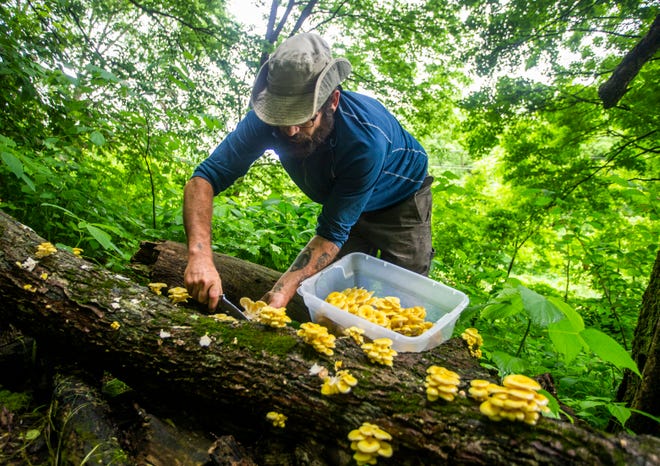Some Iowa producers question value of organic certification

DUBUQUE, Iowa (AP) - Instead of spraying pesticides, Dubuque's Stone Hollow Gardens & Shroomery uses predatory insects.
Instead of chemical fertilizers, it amends the soil with fungi, through a process called mycoremediation.
When the cabbage gets moths, farmer Christopher Appelman plucks caterpillars by hand.
Stone Hollow's practices follow U.S. Department of Agriculture organic standards — primarily, no synthetic pesticides or fertilizers or genetic modification. But because it is not certified by the USDA, Stone Hollow cannot legally use the word "organic" to market its products.
Instead, the owners say "beyond organic."
"It's just organic but better," Appelman told the Telegraph Herald.
Many tri-state producers follow organic guidelines without making it official. At Dubuque Farmers Market, more chalkboards advertise "sustainable" and "chemical-free" products than bear the "USDA Organic" seal.
Some tout "organic practices," walking a fine legal line, and invite customers to ask questions.
Tom Arnold, of Arnold's Farm in Elizabeth, Illinois, used to be certified but now raises non-GMO, antibiotic- and hormone-free livestock on his own terms. Out of 480 acres of non-GMO corn and soybeans, he sprays herbicide on only 40 to 60 acres that are located in a flood plain.
He said the lack of a market led him to quit going through the certification process after just one year.

"The organic certification people, they wanted the whole farm to be organic," he said. "We decided to find the people who supported how far we did go."
Despite following practices that could lead to organic certification, some local operations have not pursued that designation.
"We've always been scared off by the paperwork," said Jason Hull, of Little Bear Gardens in Hazel Green, Wisconsin. "They want you to keep track of every single crop you grow. There's a lot to it."
Certified operations work with an accredited agent, who verifies that practices comply with regulations. Growers must keep careful records.
Arnold's grass-fed beef and non-spray acres could be recertified, but separating the records would double his paperwork, he said.
Certification costs vary, but a one-time new applicant fee is typically a few hundred dollars, with annual per-acre fees for different crops. Some reimbursement is possible.
Opting out of certification allows more independence. Hull and others occasionally allow small breaks from certain USDA standards, like buying nonorganic seeds when more convenient. Hull said his customers approve.
"We can have that direct consumer contact," he said.
Some growers doubt the standards of organic certification as well, saying it favors corporate agriculture.
"The bigger the label gets, the more watered down it becomes," Appelman said.
He questions the select list of chemicals that certified organic farmers can use.
"My 3-year-old daughter eats directly out of our garden," he said of his 100% no-spray homestead. "I don't want anything on those plants."
Lara Mangialardi, of McGreal Family Farms in Strawberry Point, Iowa, and Arnold also raised concerns about animal welfare. Organic livestock must have outdoor space for grazing and exercise, but Arnold and Mangialardi do not see that as a promise of humane conditions.
The organic label offers some level of guarantee.
Kathleen Delate, an Iowa State University Extension and Outreach organic specialist, said most noncertified produce grown organically is the same as certified organic, but that one cannot be sure without inspection.
Jupiter Ridge, a two-acre vegetable and mushroom farm in Garber, Iowa, is pursuing organic certification. The owners were required by the Sustainable Iowa Land Trust, the nonprofit that granted them their land, to pursue one of several possible certifications.
"I think we favor the organic label because it has recognition," said co-owner Adrian White. "People know what it means."
White said the farm would probably not be pursuing certification at this time without the requirement.
White called the certification process "rigorous."
Delate, however, said first-year certification paperwork on her organic farm took only one day.
Mangialardi said McGreal Family Farms might one day pursue certification.
"It's on the radar because if we were to scale up to a certain extent, we would need it for credibility," she said.
Hull said one benefit of certification would be working with an agent who could provide insight and coaching.
Delate encourages any sustainable farming, but she pushes organic certification, in part to inform government support.
"The main thing we have is integrity," she said. "If people can't trust the organic label, that's all we have."